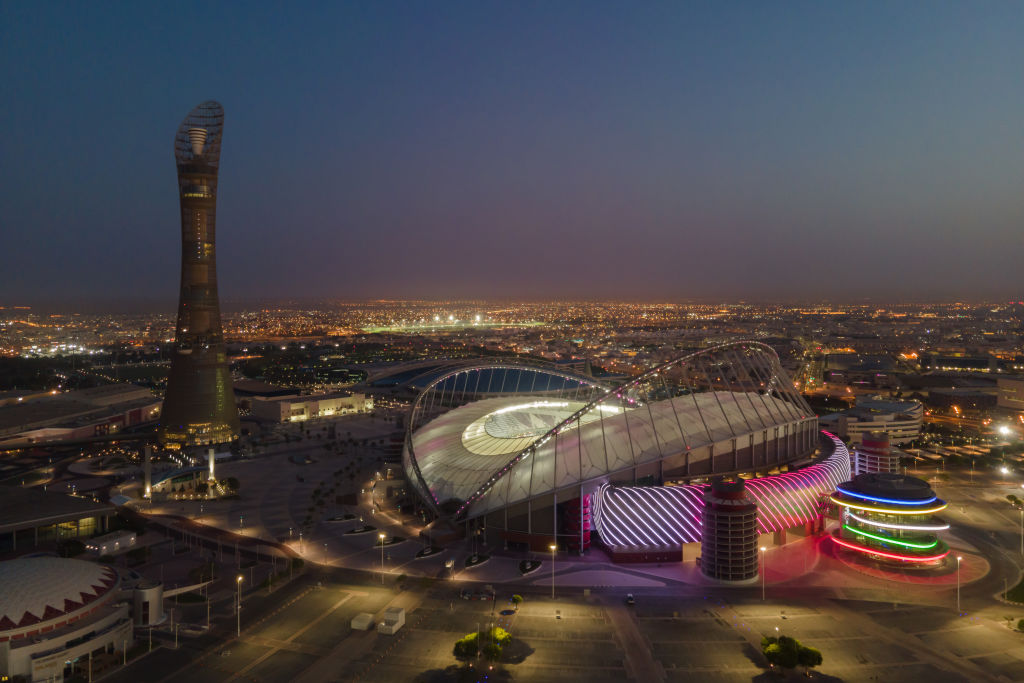So, we’re at about the halfway point in the 2022 Fifa World Cup and, while I’m delighted that England have yet to deliver our customary quadrennial disappointment, it pains me to say that a competition winner might already be emerging – and, in spite of its feeble performances on the field, it could be Qatar.
I had wanted to stay as outraged throughout the tournament as I had been when the Qatar decision was announced. But then the football got really good and the fans in the stadiums were clearly having a great time and my resolve crumbled faster than Harry Kane could stick a One Love armband back into his kitbag.
Qatar is getting exactly what it wanted: global airtime with billions watching in rapture.
In 2010, shortly before Fifa’s hosting decision, I had assured journalist friends that not even in the darkest recesses of a Zurich boardroom could football’s governing body choose Qatar. Practically, the country was too hot and too small. But then it emerged it was also too willing to hand large amounts of cash to Fifa fat-cats. The country’s treatment of migrant workers and LGBTQ+ issues were essentially ignored by Fifa – at least until its president, Gianni Infantino confessed to feeling a bit gay a couple of weeks ago.
Some lies behind the bid were exposed early on, others only a couple of weeks back. We knew several years ago that Qatar couldn’t build venues cool enough to host a summer competition. Its promise of several sustainable, flatpack stadiums to be donated to the developing world has basically been whittled down to one, Stadium 974, built using that number of shipping containers (by fortuitous happenstance for the architect, 974 is Qatar’s international dialling code).
Other untruths were kept under wraps until the eve of kick-off. Does anyone really believe that the decision to ban real beer (or as real as Budweiser gets) from stadiums, or to make Welsh fans remove their rainbow bucket hats, were only reached after the ruling Al-Thani family had a last-minute flick through the Quran?
Yet now, a fortnight into the World Cup, Qatar’s multi-billion-pound PR machine has at worst sustained just a few dents. In fact, it all seems to be going rather well for its calculating rulers and the tournament’s lavishly monikered Supreme Committee for Delivery and Legacy.
Had the football been awful the spotlight might have turned back on the organisers – but it’s generally been breathtaking. This World Cup has seen some of the most entertaining group games in recent memory. There’s been thrilling upsets aplenty from the likes of Saudi Arabia, Morocco and Australia – and I can’t recall anyone saying ‘did you see the Germans lose to Japan in homophobic Qatar?’
Qatar is getting exactly what it wanted: global airtime with billions watching in rapture. The BBC possibly thought it was teaching the Qatari royals a lesson when it tasked Gary Lineker with delivering a virtue-signalling masterclass in lieu of showing the opening ceremony but then even Lineker succumbed last week – posting a Twitter picture of his ‘favourite stadium’ there.
If they look good from the outside, then the PR ‘optics’ from inside the stadiums have been extraordinary. Doom-mongers like me never envisaged a packed house of Argentinian and Mexican fans enjoying a joyous fiesta in Doha. Or tens of thousands of impassioned Iranians, Tunisians, Moroccans and Saudis there precisely because this is the Middle East’s first World Cup.
I’m almost sorry to say that on the surface – which is probably all Qatar ever wanted – this looks like a proper World Cup even if, thankfully and notably missing, for obvious reasons, have been the usual boozed-up numpties from our neck of the woods (the only tournament-related punch-up I’m aware of was a free-for-all among the English and Welsh cultural envoys who opted to watch from the bars of Tenerife).
Outside the stadiums, yes, it’s a pretty soulless affair. Fans tell me they’ve barely met a native Qatari and one described Doha’s souk as ‘like a Disneyworld version’. But was Qatar ever seeking legitimacy as a ‘destination’? Does it really expect those paying £185 a night for a tent or £12 for a beer to come back?
No, the legitimacy has been acquired by obtaining a global audience. It’s similar to the communication strategy of bankrolling Al Jazeera, arguably a pretty balanced news channel but funded purely to sustain the narrative that Qatar is a fair and just society.
Qatar’s cause has been helped by Infantino who followed up his rambling pre-tournament speech by successfully scaring England’s and other spineless football associations into abandoning their inclusivity protests. Infantino was booed by both sets of fans when his image appeared on-screen during the England vs Wales match and – in putting himself and Fifa centrestage as the pantomime villains at this festive time of year – he reminded us who were the bad guys who sold Qatar its PR platform in the first place.
England have continued to take the knee, though it’s not entirely clear in support of what. Gay rights? Or maybe the brown lives that mattered when building the stadiums? It’s all, almost inevitably, got lost in the noise and that’s probably what Qatar gambled on.
Will there be social change in Qatar as a result of it hosting the World Cup? Hopefully. But there will be little incentive for it to do so – certainly not at anyone else’s pace – once the tournament ends.
The Qataris might be rubbish at football but they probably, for now, are celebrating a win.






Comments